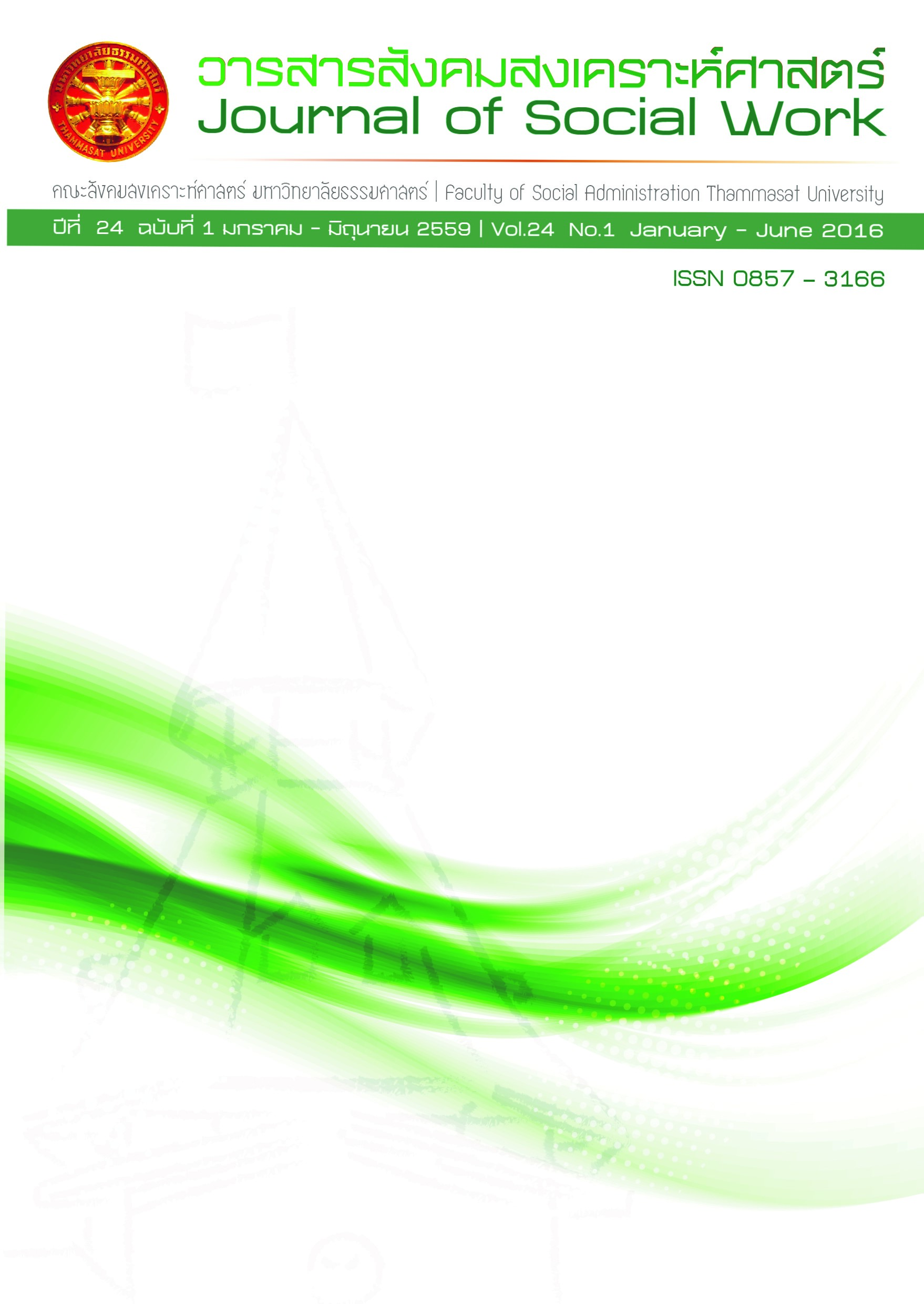Network of Social Capital and Trust
Keywords:
Network, Social capital, TrustAbstract
The close relationships of network, social capital and trust appears in the rationally reinforcing – trust generates social capital, in turn produces trust. Without foundation of trust, social capital cannot develop. Researches showed that social capital was derived from networking action with shared norm and fundamental trust. To understand social capital network with mutual trust in Thai rural communities needs to consider Buddhist philosophy, agriculture-based belief and in modern time, reciprocity principle. The paper demonstrated trusting relationships as integral mechanism for the formation, extension and existence of social capital network in two studied groups of farmers; Sanam Chai Khet and Chorrakae Sampan farmers in Chachoengsao and Supanburi provinces. The groups evolved social trust-based culture in the institutional network with shared objectives. The more groups learned about effective trust, the more they realized its productivities both quality and quantity. With the combination of reciprocity system, increasing trustworthiness constructed both horizontal and vertical relationships, groups’ assets comprised of savings groups, universal social welfare, learning center and organic products respectively. The paper concludes that the studied factor of rational trust value in farmer groups’ social capital network is the core success in their self reliance. These communities of faith sustains social capital transforming into groups’ innovations, intellectual and economic capital.
References
จิรพรรณ นฤภัทร. 2556. ทุนทางสังคมของกลุ่มชาวนา กรณีศึกษาเครือข่ายโรงเรียนชาวนา. วิทยานิพนธ์สงเคราะห์ศาสตร์ดุษฎีบัณฑิต คณะสังคมสงเคราะห์ศาสตร์ มหาวิทยาลัยธรรมศาสตร์.
นภาภรณ์ หะวานนท์ และคณะ. 2550. ทฤษฏีฐานรากในเรื่องความเข้มแข็งของชุมชน. เล่มที่ 2. กรุงเทพฯ. สำนักงานกองทุนสนับสนุนการวิจัย (สกว.).
บัวพันธ์ พรหมพักพิง และสุวิทย์ ธีรศาศวัต (บรรณาธิการ). 2546. ทุนทางสังคม : มรดกเก่าจะนำเราไปรอดจริงหรือ. ขอนแก่น. สำนักพิมพ์คลังนานาวิทยา.
วรวุฒิ โรมรัตนพันธ์. ม.ป.ป. ทุนทางสังคมกับแนวคิดตะวันออก.
สำนักงานการปฏิรูปที่ดินเพื่อการเกษตรกรรม. 2556. บทเรียน 25 ปี เครือข่ายอินแปง : วิถีคนภูพาน ตำนานชุมชนเกษตรกรรมยั่งยืน. เอกสารฉบับที่ 513. กรุงเทพฯ.
Bekkers, R., Volker, B., Van der Gaag, M., & Flap, H.(2008). Social Networks of Participants in Voluntary Associations. In N. Lin & B. Erickson (Eds.), Social Capital : An International Research Program (pp.185-205). New York, United States: Oxford University Press Inc.
Coleman, J.S. (1998). Social Capital in the Creation of Human Capital. The American Journal of Sociology, 94 (Supplement) : S95-S120.Virtues and the Creation of Prosperity.
Fu, Q. (2004). Trust, Social Capital, and Organizational Effectiveness (Master’s thesis, Virginia Polytechnic Institute and State University). Retrieve from http;//www.ipg.vt.edu>qhfumajorpaper
Fukuyama, F. (1995). TRUST : The Social Virtues and the Creation of Prosperity. London. Hamish Hamilton.
Putnum, R. (1993). Making Democracy Work : Civic Tradition in Modern Italy. Princeton. Princeton University Press.
Putnum, R. (2000). Bowling Alone : the Collapse and Revival of American Community. New York. Simon and Schuster.
Suzuki, N. & Srisontisuk, S. (2008). CIVIL SOCIETY : MOVEMENT AND DEVELOPMENT IN NORTHEAST THAILAND. Khon Kaen. Printing House of Khon Kaen University.
Downloads
Published
How to Cite
Issue
Section
License
The manuscripts published in the Social Work Journal is the copyright of the Social Work Journal, Thammasat University
Any article or opinion appeared in the Social Work Journal will solely be under the responsibility of the author The Faculty of Social Administration, Thammasat University and the editors do not need to reach in agreement or hold any responsibility.



